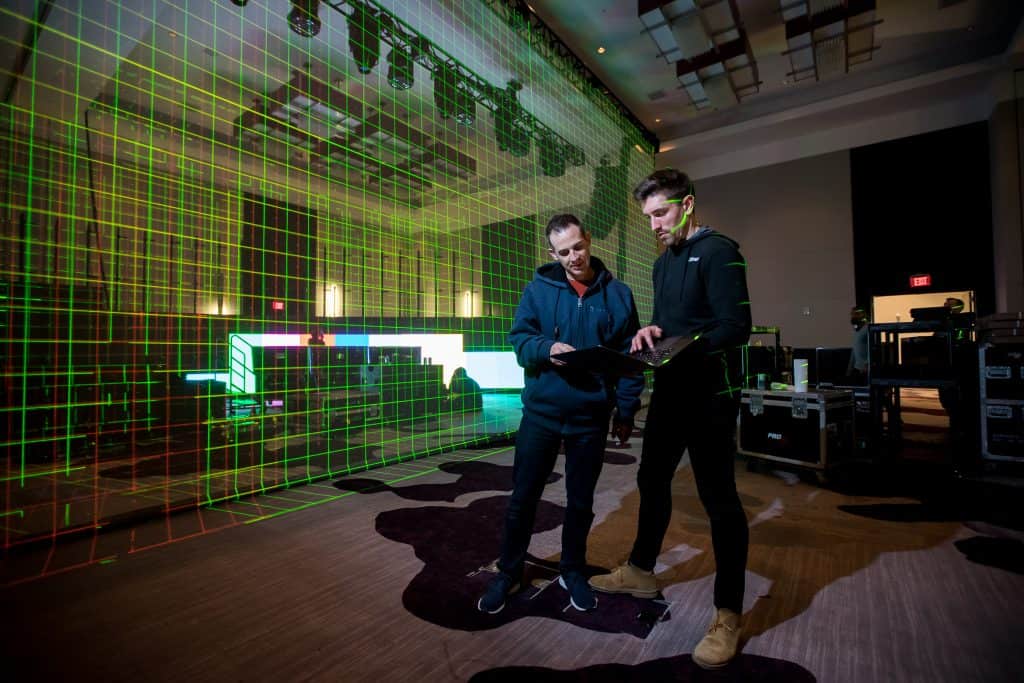Comprehending Event Production: Why It Is Essential for Successful Events
Event production plays an important role fit successful events. It entails cautious preparation, coordination, and implementation to guarantee every detail straightens with the event's vision. This process not only boosts attendee experiences however additionally helps with meaningful connections amongst participants. Understanding the details of event production can substantially affect the overall result. What are the crucial elements that contribute to a successful event, and just how can they be effectively managed?
The Function of Event Production in Producing Remarkable Experiences
Although numerous elements add to the success of an occasion, event production plays a crucial role in crafting memorable experiences. This multifaceted process includes different aspects, consisting of preparation, logistics, and implementation. Efficient event production assurances that every information lines up with the general vision, developing a smooth circulation that astounds guests. By coordinating timelines, taking care of resources, and looking after technical aspects, event producers develop a structure for impactful experiences.Moreover, they curate environments that reverberate with the target audience, boosting involvement and psychological link. From choosing appropriate venues to integrating innovative innovation, the options made during production significantly influence how participants regard and keep in mind the event. By prioritizing quality and attention to information, event production changes normal events into remarkable moments, leaving lasting impacts. Eventually, the experienced orchestration of these elements defines the significance of an event, showcasing the significance of professional event production in attaining phenomenal end results.
Secret Components of Effective Event Production
Reliable event production pivots on a number of key parts that assure success. Preparation and sychronisation establish a solid structure, while technological setup demands resolve logistical requirements. In addition, executing target market engagement methods boosts the general experience, making the event remarkable.
Planning and Sychronisation
Preparation and control work as the foundation of effective event production, ensuring that every detail straightens seamlessly to produce a remarkable experience. Effective planning includes developing a clear vision and purposes, while coordination involves the careful company of logistics, schedules, and resources. A well-defined timeline is crucial, directing all stakeholders with vital milestones and jobs. Interaction plays a pivotal duty, fostering partnership among staff member, suppliers, and venue team. Normal conferences and updates aid to deal with challenges quickly, making sure that every person remains straightened with the event objectives. Inevitably, an organized strategy to preparation and control not only boosts efficiency however additionally considerably adds to the total success and enjoyment of the event for attendees and organizers alike.
Technical Configuration Needs
A successful event depends greatly on its technological setup requirements, which include crucial elements such as audio-visual equipment, lights, hosting, and connection. Audio-visual equipment includes microphones, audio speakers, and projectors, ensuring that discussions and efficiencies are provided clearly. Proper lights improves the atmosphere and highlights essential locations, while organizing offers the necessary system for audio speakers and performers. Connection, consisting of Wi-Fi and electrical accessibility, is essential for seamless communication and technology combination. Each part needs to be carefully intended and carried out, customized to the event's details requirements. Inadequate technological setups can bring about interruptions, adversely affecting the overall experience for guests, underscoring the relevance of complete preparation and focus to detail in event production.
Target Market Engagement Methods

The Relevance of Planning and Control
Planning and sychronisation are critical to the success of any type of event production. Effective timeline administration, source allotment approaches, and team interaction characteristics play important functions in making certain that all components integrated flawlessly. Without a structured strategy to these elements, events risk encountering delays, spending plan overruns, and miscommunication among employee.
Efficient Timeline Management


While effective event production typically depends upon creative thinking and execution, reliable timeline administration remains a crucial aspect that can not be overlooked. A well-structured timeline works as the backbone of any kind of event, guaranteeing that each stage is performed in a prompt way. It enables the sychronisation of numerous tasks, from place setup to visitor arrivals, while preventing prospective traffic jams. By clearly laying out deadlines and duties, event coordinators can preserve emphasis and adapt to unanticipated challenges. Furthermore, a diligently crafted timeline fosters interaction amongst staff member, advertising liability and collaboration. Eventually, reliable timeline management not only boosts functional efficiency however likewise adds greatly to the overall success and smooth execution of the event, leaving guests with a remarkable experience.
Resource Allotment Methods
Reliable resource allotment techniques are critical for the effective execution of any event. Appropriate planning enables event coordinators to determine and disperse sources, such as funds, employees, and products, in a fashion that makes the most of effectiveness. By assessing the certain requirements of each element of the event, organizers can prioritize tasks and assign sources accordingly. Sychronisation amongst different departments ensures that all elements, from accommodating audiovisual needs, are sufficiently supported. This tactical method not only minimizes waste yet additionally boosts the general experience for guests. Additionally, anticipating possible obstacles and having contingency plans in place permits smoother procedures. Eventually, effective source appropriation adds substantially to accomplishing event goals and guaranteeing a remarkable gathering.
Group Interaction Characteristics
Just how can smooth communication amongst team participants change the event production process? Reliable interaction is important for coordinating jobs, sharing updates, and attending to challenges in real-time. When staff member participate in open discussion, they can quickly recognize potential concerns and establish solutions collaboratively, minimizing hold-ups and misconceptions. This dynamic fosters a natural atmosphere where everyone comprehends their roles and obligations, leading to an extra synchronized initiative. Additionally, routine check-ins and responses loops boost accountability and assurance alignment with the event's goals. By focusing on communication methods, teams can enhance operations, reinforce spirits, and ultimately raise the total quality of the event. Successful celebrations depend upon the ability to interact effectively, making it a crucial component of event production.
Enhancing Guest Involvement Through Innovative Style
Imaginative design plays an important duty in boosting attendee interaction at events, as it promotes an immersive setting that astounds individuals' attention. By integrating ingenious visuals, interactive aspects, and thematic style, event planners can create memorable experiences that resonate with guests. Thoughtful design styles advertise motion and expedition, urging visitors to connect with display screens and each other.Incorporating technology, such as augmented reality or live polling, further enriches the experience, enabling for real-time comments and interaction. Furthermore, sensory aspects like illumination, sound, and aroma can stimulate emotions and produce a much more appealing atmosphere.The use storytelling via style helps communicate the event's objective and message, making it a lot more relatable for guests. Inevitably, innovative layout not just improves interaction however also deepens links amongst individuals, leaving an enduring perception that extends past the event itself. This critical strategy to style is necessary for successful gatherings.
Taking care of Logistics for a Smooth Implementation
While the enjoyment of an event can attract guests in, handling logistics is vital to safeguard a smooth execution. This includes meticulously coordinating numerous aspects, from place choice and format to catering and transport. Effective logistics monitoring ensures that all components straighten, helpful hints enabling a smooth circulation from registration to the conclusion of the event.Additionally, a clear interaction plan amongst all stakeholders is necessary. This includes team, vendors, and volunteers, that should be educated of their roles and obligations. Preparing for possible challenges, such as equipment failing or unexpected weather condition conditions, can even more improve the event's success.Creating a detailed timeline assists maintain the team on the right track and allows for timely changes. Ultimately, well-managed logistics not just promote a pleasurable experience for participants but likewise mirror the professionalism and trust and dependability of the coordinators, adding to the general success of the celebration.

The Impact of Technology on Event Production
What duty does innovation play in shaping contemporary event production? Modern technology has come to be a foundation of effective event production, improving both planning and implementation processes. From innovative enrollment systems to interactive apps, modern technology improves guest administration and improves interaction. Virtual event systems enable coordinators to reach wider audiences, damaging geographical barriers and promoting hybrid events that integrate in-person and on-line experiences.Additionally, audiovisual innovations, such as high-def screens and audio systems, elevate the top quality of presentations and performances, making sure a remarkable experience for attendees - event production charlotte. Social network assimilation allows real-time responses and interaction, promoting neighborhood interaction in the past, during, and after the event. Data analytics tools help coordinators in monitoring participant habits and choices, making it possible for customized experiences that resonate with diverse audiences. Overall, the integration of modern technology in event production not only enhances operational effectiveness however likewise improves participant experiences, inevitably adding to the success of the event
Evaluating Success: Determining the Results of Your Event
Success in event production hinges on efficient examination, which entails measuring a variety of outcomes to assess the overall impact of an event. To achieve this, organizers can employ both qualitative and quantitative metrics. Measurable actions might consist of presence numbers, ticket sales, and profits produced, while qualitative evaluations may involve attendee fulfillment surveys and feedback forms.Additionally, evaluating social media engagement and media insurance coverage can provide insights right into the event's reach and brand name influence. Comparing these metrics versus predefined objectives assists establish if the purposes were met.Furthermore, post-event debriefs with the planning team can uncover lessons discovered and locations for renovation. By systematically examining these end results, event producers can enhance future gatherings, guaranteeing continual development and success. Eventually, a thorough examination not only highlights accomplishments however additionally educates critical choices for subsequent events, fostering a culture of excellence in event production.
Frequently Asked Inquiries
What Credentials Should an Event Producer Have?
Event manufacturers must possess solid business skills, imagination, and efficient communication capacities. A history in project administration, budgeting, and arrangement is crucial. Appropriate certifications and experience in varied event kinds even more boost their certifications.
How Can I Decrease Event Production Expenses Efficiently?
To effectively decrease event production costs, one can streamline supplier option, bargain agreements, utilize in-house resources, focus on necessary elements, execute innovation for effectiveness, and check out sponsorship possibilities to offset expenditures without jeopardizing high quality.
What Are the Typical Difficulties in Event Production?
Common obstacles in event production consist of spending plan restrictions, logistical control, vendor monitoring, time restrictions, attendee involvement, technological problems, and unexpected circumstances - event production charlotte. Each factor can significantly affect the general success and smooth execution of the event
Exactly how Do I Choose the Right Venue for My Event?
Selecting the best place includes taking into consideration variables such as location, capacity, services, and spending plan. find here In addition, reviewing availability and ambiance ensures the chosen area lines up with the event's goals and boosts the overall attendee experience.
What Is the Typical Timeline for Preparation an Event?
The typical timeline for intending an occasion varies, yet usually consists of phases such as principle growth, location selection, supplier sychronisation, promotion, Related Site and last prep work, frequently covering numerous months to ensure an effective execution.